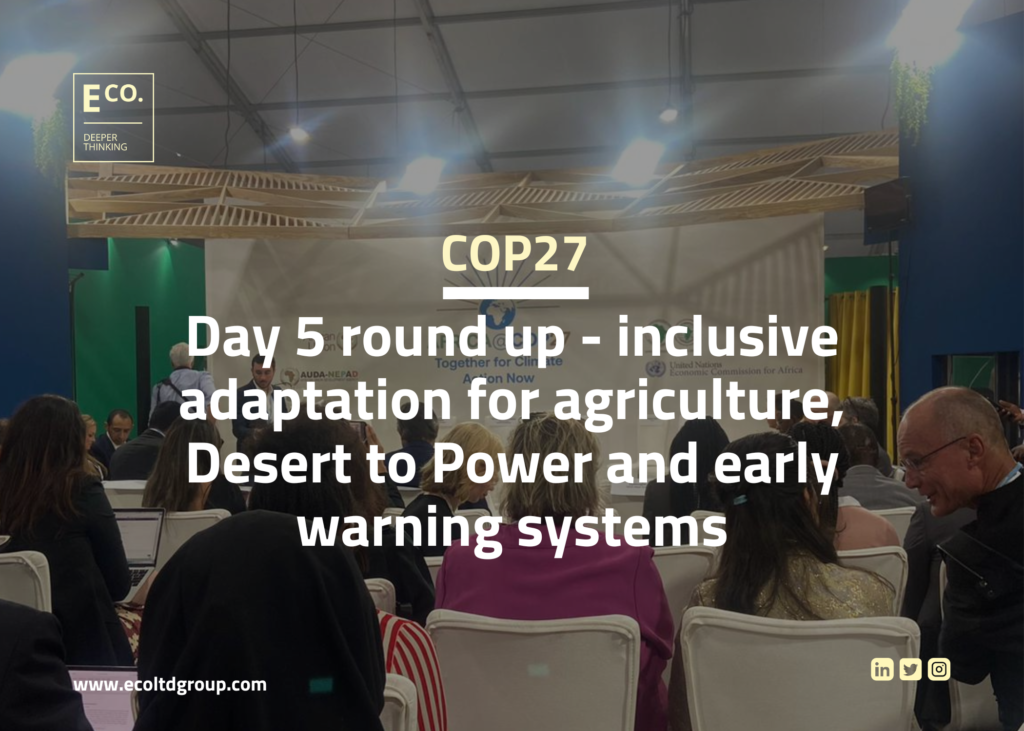COP27: Day Five round up – inclusive adaptation for agriculture, Desert to Power and early warning systems
11 November 2022, Category: All insights, News, Tags: adaptation, climate change, climate finance, COP27, Deserttopower, earlywarningsystems, Green Climate Fund, sustainable development

On day 5 of COP27 , the Food and Agriculture pavilion, sponsored by CGIAR and FAO, hosted a discussion on inclusive adaptation for agriculture. Smallholdings represent over 80% of the world’s farms and supply half of global food. However, communities around the world, and particularly smallholder farms, are facing devastating climate impacts in the agriculture sector. Climate change-related droughts, natural disasters, and crop failures are undermining livelihoods and food security, and leading to mass forced displacements.
Panellists noted that while approximately a third of all greenhouse gas emissions come from food systems, just 3% of climate finance is focused on this area. Equally, the vast majority of NDCs, speakers mentioned, are not prioritising food systems at the level needed. The multiple crises of Covid, climate change and conflict have created the perfect storm for widespread food insecurity. The representative of CGIAR provided some horrifying figures to not only explain how food crises have worsened in recent years but also the staggeringly disproportionate burden on women. She said that in 2018, 18 million
more women than men faced food insecurity globally. In 2021, this figure had risen to 150 million. In many countries, women do not have the resources to adapt to climate change which limits the ability to diversify livelihoods. This creates a situation where climate impacts lower agricultural production which leads to less income, less income causes lower standard of living and greater poverty.
Desert to Power
At the Africa Pavilion, an event discussed the Desert to Power project in the Sahel region which aims to enhance energy access in countries with low electrification rates – such as Chad, Niger and Mauritania – through an enormous expansion of solar. Dr. Akinwumi Adesina, President of the African Development Bank, spoke about the region having some of the best solar potential in the world but currently accounts for around only 730 MW – 0.086% of total global solar generation. The project, which was given funding from the GCF, the governments of Norway and Sweden, and others, aims to enhance energy security in the regions and give tens of millions of Sahelians access to reliable, sustainable electricity.
E Co. is very proud to have worked on the development of the GCF funding proposal for
the Desert to Power project which was approved in 2021. For more information on the
project, see here.
Early warning systems
A key topic of conversation has been on the need for integrating innovative technologies for use at the local level, a topic that came up on day five of COP27. The United Nations Capital Development Fund (UNCDF) today hosted a panel focusing on scaling up early warning systems, and enable early action, to better manage climate and disaster risks. Often countries suffer enormously as a result of extreme weather events that can be predicted ahead of time because they do not have access to the technology.
Early warning systems are critical to provide information to vulnerable communities that allows them to buy time prior to extreme weather events and disasters. Panellists, including representatives of the United Nations Office for Disaster Risk Reduction (UNDRR), World Meteorological Organization (WMO), the German Development Agency (GIZ) and small island developing states.
The message was clear, “we’re constantly in firefighting mode and the firefighting has toget bigger every year but the resources don’t follow at the same scale – this is an unsustainable approach.” While the discussion surrounding resilience-building technologies, especially early warning systems, has continued at pace, the willingness to invest at the necessary scale has not been forthcoming. Speakers pointed to several needs for the effective rollout of these technologies:
- Form partnerships between organisations and governments to share key lessons
learned – there is no need for competition between countries of such issues
because climate change impacts everyone; - Create an integrative framework for multi-hazard early warning systems and
develop and nurture the skills of local communities to understand how they work
and to make evidence-based decisions using the information; - Share data. A lack of reliable data is a big barrier and countries should seek to
share what they have – both real-time and historical – to better classify climate
risks.
The goal of ‘Early Warning for All’ in the next five years is a big one, but the economic costs of introducing these systems are far outweighed by the benefits.
Deep dive: The most important developments for climate finance at COP27
Climate finance was a vitally important topic under discussion at COP27, and many game-changing decisions were made at the summit.
We’ve developed a handy deep dive guide into these decisions and what they mean for the wider world of climate finance and climate resilience.
Let’s accelerate climate action together
Let’s accelerate progress together: Get in touch with our climate finance consultants to discuss a project you’re working on. Email us at: amy@ecoltdgroup.com or find us at the following:
Twitter: @ecoltdnews
LinkedIn: E Co.
Instagram: @ecoltdnews
Please feel free to share your comments below or send an email to: gcfinsight@ecoltdgroup.com
Join the conversation by posting a comment below. You can either use your social account, by clicking on the corresponding icons or simply fill in the form below. All comments are moderated.